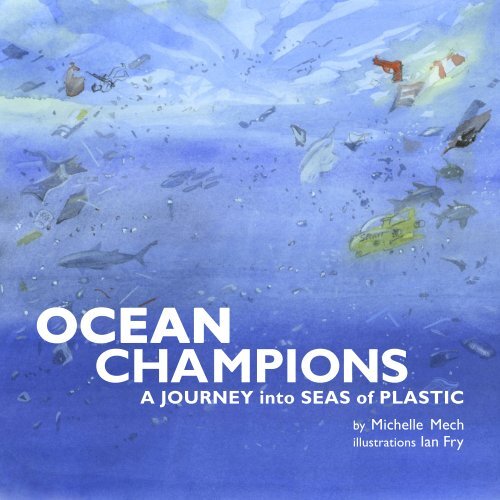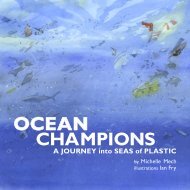You also want an ePaper? Increase the reach of your titles
YUMPU automatically turns print PDFs into web optimized ePapers that Google loves.
OCEAN<br />
CHAMPIONS<br />
A JOURNEY into SEAS of PLASTIC<br />
by Michelle Mech<br />
illustrations Ian Fry
Once upon a tide, a high tide, early on a sunny day, Kai and Morgan were playing<br />
on the beach. The two friends were on a holiday at the seashore with their parents<br />
and thought that this was going to be just like any other ordinary, fun day. But then<br />
they heard something in the distance.<br />
They ran down the beach and saw a plastic bottle, looking very sad and clinging to<br />
the sand at the water’s edge. Morgan picked the bottle up and asked, “What’s wrong?”<br />
“I’m Botley and I’m upset because<br />
I was left here beside the ocean<br />
instead of being recycled.
“A wave caught me and almost carried me into the water and plastic is very bad<br />
for the oceans.”<br />
“Well, you will have to come with us and tell us more,” said Morgan. Botley broke<br />
out in a smile.<br />
As they walked along the beach, Botley explained, “Plastic is so dangerous for ocean<br />
animals. They can get tangled up in it or mistake it for food, which can hurt them,<br />
make them sick, or even kill them. And so many things that humans use are plastic.”<br />
“Like cups, plates, food containers, and toys,” responded Morgan.<br />
“Yes,” said Botley. “And many items you might not think of as plastic – like cellphones,<br />
balloons, disposable diapers, fishing nets and lines, and even many of the materials<br />
used to make clothes.<br />
“Oh look! There’s a plastic grocery bag. Can you grab it before it gets blown into the ocean?”
Kai ran to the bag, picked it up and tucked it into his pocket. Botley said, “There are<br />
millions of plastic bags used all over the world and most do not get reused or recycled.<br />
Many are littered or blown out of landfills, where garbage is dumped, and end up<br />
in the oceans.”<br />
Morgan looked down the beach and spotted two dolphins in the water just off the<br />
shoreline. The children ran closer and saw that one dolphin had a large piece of fishing<br />
net caught on its beak and dorsal fin. The other dolphin said, “I’m Dilan and this is<br />
my friend Dash. Because of the fishing net, Dash can’t catch fish, so she is very hungry.<br />
We need to get the net off of her; otherwise she will starve to death!”<br />
Kai said, “You stay here with the dolphins Morgan and I’ll run to where<br />
we’re staying and try to call an animal rescue center.”
Several minutes later Kai returned with their parents. He told the dolphins help was<br />
on the way. Other people gathered on the beach to watch.<br />
Soon an unusual looking boat arrived and stopped just off the shore. Two people<br />
climbed out. “We are Marina and Tyler from the <strong>Ocean</strong> Animal Rescue and Research<br />
Centre and we’re here to help,” Marina explained.<br />
She and Tyler waded over to the dolphins and very carefully pulled the<br />
fishing net <strong>first</strong> off Dash’s fin and then off her beak. Next they<br />
cleaned the places where the net had cut into her skin.
“Thank you so much,” said Dash. Then she and Dilan turned and headed out to sea<br />
while everyone watching cheered.<br />
Marina explained to the people on the beach, “Fishing nets and gear that get<br />
lost or thrown away are called ghost nets because they drift with the ocean<br />
currents +1 and continue to catch fish and also other marine animals,<br />
often trapping them below the surface. Sea turtles and marine<br />
mammals like dolphins and seals need to be able to get back<br />
to the surface for air, otherwise they drown.”<br />
Marina noticed Botley and asked,<br />
“Who do we have here?”<br />
“This is Botley and he is teaching<br />
us about plastic in the oceans,”<br />
answered Morgan.
“Would you like to come with us to learn more?” asked Marina.<br />
“We’ll bring you back safe and sound.”<br />
“Yes, yes!” the children replied excitedly, after their parents agreed they could go.<br />
“We’ll take along this piece of fishing net and recycle it later,” said Tyler. Marina told<br />
the children and Botley that their boat, Spirit, is a super submersible, meaning it<br />
can travel very fast underwater, as well as on the surface of the ocean.<br />
When Tyler returned, they<br />
all climbed aboard and<br />
buckled their seat belts.<br />
Marina closed Spirit’s<br />
dome and away<br />
they went, surprised<br />
and happy to soon<br />
see Dilan and Dash,<br />
swimming alongside<br />
and criss-crossing<br />
in front of them.<br />
After several minutes,<br />
the dolphins waved<br />
their flippers in<br />
farewell and<br />
sped away.
As Spirit skimmed along,<br />
Marina asked her guests<br />
if they know why our<br />
oceans are so important.<br />
Morgan responded,<br />
“They provide many<br />
people with food and jobs.”<br />
“We can have lots of fun<br />
in them and also travel<br />
on them to other places,”<br />
answered Kai.<br />
EVAPORATION<br />
“And they are so beautiful,” added Botley.<br />
“You are all correct,” said Marina, “but there are other<br />
very important things the oceans do for us.<br />
“The oceans cover much more of the Earth’s surface than the land and they<br />
provide most of water in the water cycle. In this cycle,<br />
the sunheats up the surface of the oceans and it evaporates and turns into water<br />
vapour. Some of this vapour condenses into water droplets and forms clouds.
PRECIPITATION<br />
CONDENSATION<br />
“When these droplets get too<br />
heavy for the air to hold them,<br />
they fall back to earth as<br />
precipitation – rain, snow,<br />
hail or sleet – which is<br />
necessary for the survival<br />
of plants and animals.<br />
The water cycle and<br />
the ocean currents and<br />
winds play a big part<br />
in controlling our weather<br />
patterns and air temperatures.<br />
“As well, more than half of Earth’s oxygen – oxygen that we need<br />
to breathe and live – is produced by phytoplankton, tiny plant-like<br />
creatures that live in the oceans. The oceans are our life support<br />
system and all life on Earth needs healthy oceans.”




